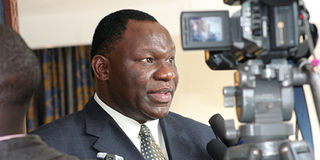Group freezes rollout of 4G network in Kenya

Photo/FILE
Information and Communication PS Bitange Ndemo.
A consortium spearheading the rollout of the national long term evolution network, commonly known as 4G, has put the project on hold until the country shifts from analogue to digital broadcasting systems.
In an interview with Smart Company, Information and Communication permanent secretary Bitange Ndemo said members of the consortium have decided to halt the project until the migration which will free up the spectrum set for use by the network.
“The process is currently stopped but we are not sure when the analogue signal will be switched off to release the spectrum,” said the PS.
In August 2011, the government, through the Ministry of Information and Communication, invited the private sector to partner in the project estimated to cost about Sh42 billion.
In adopting the public-private partnership model, the government hoped to set a global precedent, where operators can share both active network components — the parts of networks which are responsible for generating, transmitting, and receiving signals and passive components — and those not involved with signal processing such as the steel.
It would also allow smaller operators who may not afford the expensive licence fees or the capital expenditure of rolling out the network to enjoy the benefits of the platform equally, the end beneficiary being the consumer.
The process has been ongoing albeit at a slower pace given that Dr Ndemo expected the network to be operational by end of last year.
However, shifting to the digital platform is not the only challenge facing the 4G national project. Questions have been raised about the timing and essence of the project given the slow uptake recorded in the current 3G networks.
Safaricom, a member of the consortium heading the project’s implementation, said the country is not ready for the rollout of 4G if demand of its 3G network by subscribers, which remains largely underused, is anything to go by.
This is a sentiment shared by all the other telecoms except yuMobile, which says the project should be hastened so that the firm can start enjoying the fruits of a fast-growing mobile data market.
Digital migration was supposed to be effected in Kenya by June last year but the government, aware that it could not beat the deadline, decided to execute the project in phases and chose Nairobi as the first region in which digital signal would go live.
But less than two months to the December 31 deadline for the switchover in the city, a consumer lobby moved to the court to block the migration, arguing that it would deny the public their right to information due to the high cost of set-top boxes.
The High Court in January ordered the Communications Commission of Kenya and the consumer lobby to agree on a suitable date for the signal migration. Talks between the two started in February and the switch-off date was agreed to be “not earlier than September 15 this year’.
But Dr Ndemo now says Kenya should have stuck to its earlier timelines in order to meet the June 2015 global deadline.
By agreeing to an earlier deadline than the global switchover date, the region hoped to take advantage of the longer time to address any emerging challenges.
Tanzania is the only country in the region that has adhered to the deadline agreed by the member states on switching off analogue broadcasting signals in Dar es Salaam on December 31, 2012.
“Tanzania is going to have a better learning experience than any other country and that is why we wanted to stick to the December switch-off deadline for Nairobi,” said Dr Ndemo.




